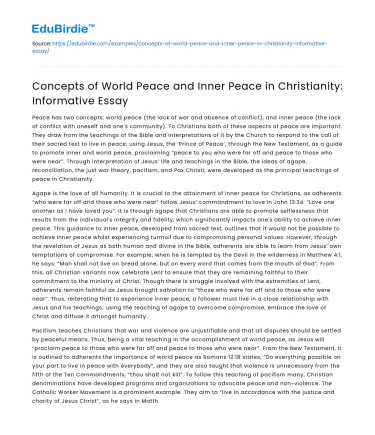Peace has two concepts: world peace (the lack of war and absence of conflict), and inner peace (the lack of conflict with oneself and one’s community). To Christians both of these aspects of peace are important. They draw from the teachings of the Bible and interpretations of it by the Church to respond to the call of their sacred text to live in peace: using Jesus, the ‘Prince of Peace’, through the New Testament, as a guide to promote inner and world peace, proclaiming “peace to you who were far off and peace to those who were near”. Through interpretation of Jesus’ life and teachings in the Bible, the ideas of agape, reconciliation, the just war theory, pacifism, and Pax Christi, were developed as the principal teachings of peace in Christianity.
Agape is the love of all humanity. It is crucial to the attainment of inner peace for Christians, as adherents “who were far off and those who were near” follow Jesus’ commandment to love in John 13:34: “Love one another as I have loved you”. It is through agape that Christians are able to promote selflessness that results from the individual's integrity and fidelity, which significantly impacts one's ability to achieve inner peace. This guidance to inner peace, developed from sacred text, outlines that it would not be possible to achieve inner peace whilst experiencing turmoil due to compromising personal values. However, through the revelation of Jesus as both human and divine in the Bible, adherents are able to learn from Jesus’ own temptations of compromise. For example, when he is tempted by the Devil in the wilderness in Matthew 4:1, he says: “Man shall not live on bread alone, but on every word that comes from the mouth of God”. From this, all Christian variants now celebrate Lent to ensure that they are remaining faithful to their commitment to the ministry of Christ. Though there is struggle involved with the extremities of Lent, adherents remain faithful as Jesus brought salvation to “those who were far off and to those who were near”. Thus, reiterating that to experience inner peace, a follower must live in a close relationship with Jesus and his teachings; using the teaching of agape to overcome compromise, embrace the love of Christ and diffuse it amongst humanity.
Save your time!
We can take care of your essay
- Proper editing and formatting
- Free revision, title page, and bibliography
- Flexible prices and money-back guarantee
Pacifism teaches Christians that war and violence are unjustifiable and that all disputes should be settled by peaceful means. Thus, being a vital teaching in the accomplishment of world peace, as Jesus will “proclaim peace to those who were far off and peace to those who were near”. From the New Testament, it is outlined to adherents the importance of world peace as Romans 12:18 states, “Do everything possible on your part to live in peace with everybody”, and they are also taught that violence is unnecessary from the fifth of the Ten Commandments, “thou shalt not kill”. To follow this teaching of pacifism many, Christian denominations have developed programs and organizations to advocate peace and non-violence. The Catholic Worker Movement is a prominent example. They aim to “live in accordance with the justice and charity of Jesus Christ”, as he says in Matthew 26:52, “Put your sword back into its place. For all who take the sword will perish by the sword”. To comply with Jesus’ model of peace, the Catholic Worker Movement teaches to fight against violence with prayer, fasting and refusing cooperation with evil, reminding Catholics that Christ brought humanity, both “those who were far off and those who were near”, salvation, thus removing the need for violence. Further proving that it is through a relationship with Christ and his teachings through the Bible that world peace can be promoted.
Therefore, through sacred text, Christian adherents are called to advance experiences of both inner and world peace. The principal teachings of peace, agape and pacifism, developed from Jesus’ experiences and teachings evident in the New Testament, provide a silhouette for adherents to follow in the attainment of this peace. These teachings recapitulate the necessity of adherents to have a close relationship with Jesus and his teachings in the journey of achieving peace, as ultimately through his revelations as both human and divine, bringing salvation to humanity, he “proclaims peace to those who were far off and those who were near”.






 Stuck on your essay?
Stuck on your essay?

